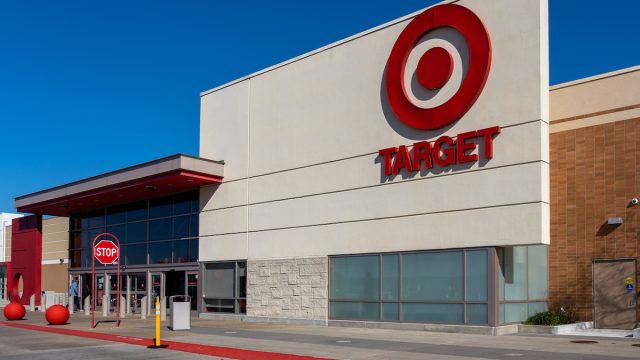Target Shoppers Abandoning the Store Over Anti-Theft Measures: New "Level of Insanity"
Shoppers have to ring for assistance when trying to buy things like toothpaste and underwear.
Despite an industry-wide influx of anti-theft measures, shoplifting or "shrinking" is steadily on the rise. A report by the Council on Criminal Justice (CCJ) revealed that New York City saw a 64 percent increase in retail theft from mid-2019 through June 2023, while Los Angeles saw a 109 percent increase in reported retail theft during the first six months of 2023 alone. And it appears the numbers aren't slowing down anytime soon. The 2023 National Retail Security Survey found that the average shrink rate rose from $93.9 billion to $112.1 billion over the course of one year.
RELATED: Walmart and Target Anti-Theft Measures Could Be "Final Nail in the Coffin," Shoppers Say.
The increase in shoplifting has forced retailers like Target to hire security, station more employees at self-checkout, and even close some stores. They're also displaying pricier merchandise behind locked glass barriers that require the help of a store employee to gain access. While some customers remain unbothered by the new security measure, others claim the new set-up is a huge inconvenience.
Many shoppers have voiced their frustration with Target on social media, sharing how they're tired of having to ring for assistance when grabbing something as mundane as deodorant or toothpaste.
"Glad these are locked up!" one customer wrote on X, alongside a photo of locked-up loofahs. "I wouldn't want target to take the financial hit from people shoplifting these. Also, I'm happy to have to bother an employee to help me get one of these."
"My local target locked up bandaids, Advil, deodorant, baby formula and diapers, legos and men's boxers…. You don't see this as a problem??? Like??" cried another.
In another post, someone accused Target of treating its customers like "criminals" under a photo of a laundry detergent aisle entirely behind glass. "Almost every row at this Target is locked up," they continued. "I don't even want to go here because it's so annoying and takes FOREVER for the person to come and unlock the laundry soap."
One shopper added in agreement: "See usually I just do a Target drive up order but I wanted to film a cute little TikTok today so I decided to go inside I'm so irritated. This [expletive] ain't even fun no more. All them products locked up like animals in a zoo."
While customers can reason with Target choosing to lock-up more expensive merchandise such as electronics and fancy kitchen appliances, they argue the store has taken it a step too far in the clothing department. Photos taken by one shopper show everyday basics—including undergarments—displayed in glass cages.
"This is getting ridiculous. @Target locked up the men's socks and underwear at their WeHo location. I can't imagine any loss justifies this level of insanity," they penned.
Following Target's earnings release in 2022, Yahoo! Finance reported that the chain was expected to lose $1.2 billion in profits largely due to organized retail crime between 2022 and 2023. Though that may be the case, Target's CFO Michael Fiddelke remains optimistic about the future.
"Growth in shrink remains a significant financial headwind," Fiddelke told investors during a Q3 earnings report, per the outlet. "We think progress there probably doesn't happen quickly but we're focused on progress over time, and you'll see us continue to take the actions to get a better outcome there over time, but it's not one that we'd expect overnight."
To that point, after NBC affiliate KNTV ran an article about the store locking up items like underwear, a Target spokesperson commented to the outlet: "On a limited basis, we employ theft deterrent merchandising strategies, such as locking cases, for categories that are prone to theft."






















